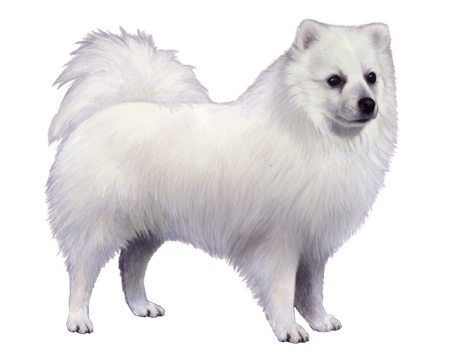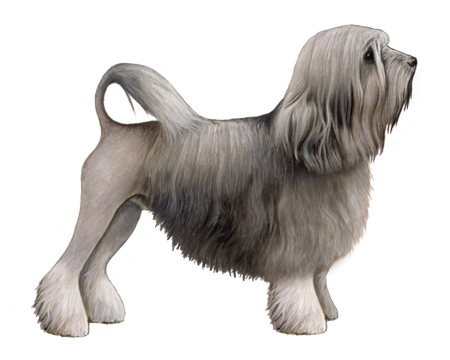
Brussels Griffon
The Brussels Griffon is a big dog in a small package. Known for its oversized personality, this breed is alert, curious, and energetic. Brussels Griffons are also sensitive and need almost-constant companionship.
Interested in discovering if your dog is a Brussels Griffon?
Check out Wisdom Panel's DNA tests.

Brussels Griffon Traits
General Appearance
Brussels Griffons have short, thick bodies and almost human expressions described as alert and curious. They move with a purposeful (and adorable) trot.
Coat and Coloring
The Brussels Griffon can have two distinct coat types: smooth or rough. Rough-coated Brussels Griffons have wiry and dense coats (silky hair is considered a departure from the breed standard). Their rough coats are long but not shaggy and include wiry hair that's slightly longer around the face. The fringe around their faces earned them the nickname "the bearded dog." In contrast, smooth-coated Brussels Griffons have straight, short, tight, and glossy hair.
The breed comes in four colors: red, belge (a mix of black and reddish brown), black and tan, or solid black.
Distinctive Physical Traits
Brussels Griffons have large, round skulls with domed foreheads, big black eyes with prominent eyelashes, and small, high set ears.
Brussels Griffon Temperament
Described as "full of self-importance," the Brussels Griffon is curious and alert. Though this breed is playful and energetic, it also has a sensitive side and prefers mature companions. For this reason, it may not be the best choice for families with small children. When Griffs are around kids, supervision is required to prevent these little dogs from getting hurt.
Griffs are also sensitive about being left alone for too long. They have been called "Velcro dogs" and prefer to live with people who are home most of the time (or willing to let them tag along wherever they go).
Brussels Griffons bond with their owners and are known as affectionate, loving dogs but can be nervous around strangers or in new situations. Once they warm up, these small dogs let their big personalities shine. In no time at all, they start working a room, convincing others to adore them.
Griffs aren't aggressive or overly vocal but expect them to bark when someone comes to the door.
These moderately active dogs require regular exercise to stay happy and healthy.


Brussels Griffon History
In the 1800s, Belgian coachmen kept small dogs in the stables to catch rats. The Brussels Griffon—a descendent of several breeds, including the English Toy Spaniel and an old Belgian breed called the Brabancon—proved to be an ideal dog for the task. These dogs were not just good at capturing vermin. Brussels Griffons also excelled at capturing the attention of humans who saw them as affectionate, adorable companions.
Henrietta Maria, Queen of the Belgians, fell in love with the Brussels Griffon, as did members of the upper classes. Refinement of the breed continued until smaller bodies and expressive faces became the Brussels Griffon's hallmark features.
In the early 1900s, Europe exported the first "Griffs" to America, where they achieved instant popularity. The Brussels Griffon that starred alongside Jack Nicholson in the movie As Good As It Gets helped the breed gain more recognition (and a lot of fans).
Brussels Griffon Care
Nutrition
Brussels Griffons require high-quality dog food that's appropriate for their life stage (e.g., puppy, adult, senior). Consider a food formulated specifically for small breeds. To keep Griffs from packing on the pounds, use a measuring cup to serve the correct portions and limit treats to no more than 10% of their daily calories.
Grooming
Smooth-coated Brussels Griffons require less grooming than the rough-coated variety. An occasional bath and weekly brushing are all it takes to remove dirt and excess hair. During shedding season, which happens in the spring and fall, their coats will need daily brushing to remove dead hair.
Rough-coated Brussels Griffons also need occasional baths and weekly brushings. However, they also need regular hair trims to keep them looking their best.
Nail trims and ear cleaning are also essential grooming tasks.
Brussels Griffons benefit from regular dental care. Start brushing their teeth at home when they're young and talk to a veterinarian about professional dental cleanings to ensure good oral hygiene throughout their lives.
Exercise
The Brussels Griffon is a moderately active breed that requires regular exercise. Whether it's a daily walk or game of fetch in the backyard, Griffs love being active with their owners. Consider activities such as competitive obedience, rally, tracking, or agility. These offer physical and mental stimulation and combine active play with opportunities to bond.
Training
Brussels Griffons have two characteristics that make them easy to train: intelligence and strong bonds with their owners. Routine training can ensure that Griffs respond to commands, learn new tricks, and become well-adjusted, confident companions. As with many small breeds, housebreaking can be a challenge.
Since the Brussels Griffon is a sensitive breed, use positive, reward-based training and not harsh reprimands during training sessions. Early socialization can help them feel more confident and overcome their wariness around strangers.

Breed Group
Companion
This group consists of dogs typically bred for the specific purpose of human companionship, and many are popular pets because of their gentle nature. They became more common as the concept and luxury of dogs as pets prevailed.
Resources
https://www.akc.org/dog-breeds/brussels-griffon/
https://abga.club/about-the-breed/
Reviewed July 26, 2020 by Laura Inman, DVM



























_Color.png)










